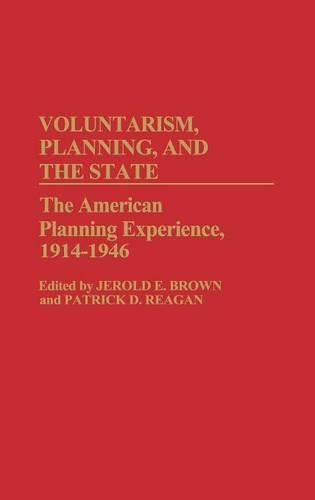
Voluntarism, Planning, and the State: The American Planning Experience, 1914-1946
(Hardback)
Publishing Details
Voluntarism, Planning, and the State: The American Planning Experience, 1914-1946
By (Author) Jerold E. Brown
By (author) Patrick Reagan
Bloomsbury Publishing PLC
Praeger Publishers Inc
11th November 1988
United States
Classifications
Tertiary Education
Non Fiction
Regional, state and other local government
350.00720973
Physical Properties
Hardback
188
Description
Voluntarism, Planning, and the State presents a series of case studies of the planning process in the context of modern American history in the period between World War I and World War II. Each essay draws on the works of leading scholars in the field and attempts to make specific evaluations of broad generalizations about the planning experience in the United States. The studies examine such relevant topics as unemployment reform, labor relations, military peacetime planning, New Deal planning, and the postwar debate over price and wage controls.
Reviews
In 1974 the Initiative Committee for National Economic Planning was organized with the help of Leonard Woodcock. Since that time organized labor's agenda for planning has grown to include a variety of ideas that fall under the broad heading of industrial policy' . . . . In seven different papers, the evolution of planning in America from the Progressive era to the end of World War II is discussed. Of the seven essays, I found four to be especially interesting. Donald Murphy's essay on the American Association for Labor Legislation (AALL) traces the history (from 1914 to 1929) of that organization's efforts to promote measures that would prevent unemployment. He argues that during the 1920s the AALL often conceded to the voluntarist and and anti-statist pressures of the times. But at times it was also a proponent of active government involvement and public sector planning to combat unemployment.-Labor Studies Journal
The provocative essays in this interesting volume should spark further, much needed inquiry into the contradictory history of American planning.-Journal of Economic History
"The provocative essays in this interesting volume should spark further, much needed inquiry into the contradictory history of American planning."-Journal of Economic History
"In 1974 the Initiative Committee for National Economic Planning was organized with the help of Leonard Woodcock. Since that time organized labor's agenda for planning has grown to include a variety of ideas that fall under the broad heading of industrial policy' . . . . In seven different papers, the evolution of planning in America from the Progressive era to the end of World War II is discussed. Of the seven essays, I found four to be especially interesting. Donald Murphy's essay on the American Association for Labor Legislation (AALL) traces the history (from 1914 to 1929) of that organization's efforts to promote measures that would prevent unemployment. He argues that during the 1920s the AALL often conceded to the voluntarist and and anti-statist pressures of the times. But at times it was also a proponent of active government involvement and public sector planning to combat unemployment."-Labor Studies Journal
Author Bio
JEROLD E. BROWN is Associate Professor of History at the U.S. Army Command and General Staff College, Fort Leavenworth, Kansas, and has contributed articles to Aerospace Historian and Periodical. PATRICK D. REAGAN is Associate Professor of History at Tennessee Technological University, and a contributor to Historical Dictionary of the New Deal (Greenwood Press, 1985). His articles have been published in Mid-America and Ohio History.
